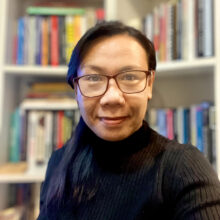Power Currents: Asian Media in the World
Power Currents: Asian Media in the World recenters media within Asian studies and Asia within media studies in foregrounding Asian perspectives that have been overlooked or marginalized in universalizing claims and theories of global media cultures. The transformations in Asia’s media landscapes are both shaping and being shaped by histories, traditions, demographics, industrial structures, and governance dynamics that demand analyses and approaches drawn from Asian points of reference. The series aims to showcase research on analog and digital media forms past and present as they course in, around, and through Asia, with an emphasis on projects that explore the converging currents of media and power—cultural, political, economic, technological—as they flux and flow across local, regional, and transnational contexts.
Possible themes include:
- Affectivity and Embodiment
- Archive and Architecture
- Ideology and Institutions
- Mobilities and Ecologies
- Techno-Orientalism and Techno-Modernity
- Violence and Community
Attending to the complexity and centrality of Asian media products and practices amidst global reconfigurations of power, the series invites monographs and edited volumes from first-time and experienced scholars that investigate the ever-shifting political and ethical ramifications of media presence and change in Asia—broadly conceived to include West, Central, South, Southeast, and East Asia, as well as the Pacific Islands—and throughout Asian networks of influence worldwide.
Acquiring Editor: William Masami Hammell
Editorial Board:
- Emma Baulch (Monash University Malaysia)
- Nusrat Chowdhury (Amherst College)
- Christopher Gerteis (SOAS University of London)
- Larissa Hjorth (RMIT University)
- Joseph Jonghyun Jeon (University of California, Irvine)
- Naveeda Khan (Johns Hopkins University)
- Marwan M. Kraidy (Northwestern University in Qatar)
- Lisa Yuk Ming Leung (Lingnan University)
- Shaoling Ma (Cornell University)
- Mirca Madianou (Goldsmiths, University of London)
- Yoshitaka Mōri (Tokyo University of the Arts)
- Usha Raman (University of Hyderabad)
Series Editors
Rahul MukherjeeUniversity of Pennsylvania
Rahul Mukherjee is the Dick Wolf Associate Professor of Television and New Media Studies and associate professor of English at the University of Pennsylvania. His research interests include database management systems, advertising cultures of mobile telephony, Bollywood thrillers, development discourses, chronic toxicity, and translocal documentaries. He is author of Radiant Infrastructures: Media, Environment, and Cultures of Uncertainty and Unlimited: Aspirational Politics and Mobile Media Distribution (forthcoming).

Cheryll Ruth SorianoDe La Salle University
Cheryll Ruth Soriano is professor of communication at De La Salle University. Her research focuses on the implications of digital communication on social, cultural, and political processes, with emphases on media ethics, platformization of cultural production, and platform labor. She is coauthor of Philippine Digital Cultures: Brokerage Dynamics on YouTube and coeditor of Asian Perspectives on Digital Culture: Emerging Phenomena, Enduring Concepts.

Jonathan E. AbelPennsylvania State University
Jonathan E. Abel is professor of Asian studies and comparative literature at The Pennsylvania State University. He is a scholar of Japanese media, film, and literature with interests in global modernism, literary reception, translation studies, film studies, new media, and literary and cultural theory. He is author of Redacted: The Archives of Censorship in Transwar Japan and The New Real: Media and Mimesis in Japan from Stereographs to Emoji, coeditor of Information: Keywords, and co-translator of Otaku: Japan’s Database Animals by Azuma Hiroki and Nation and Aesthetics: On Kant and Freud by Karatani Kōjin.


